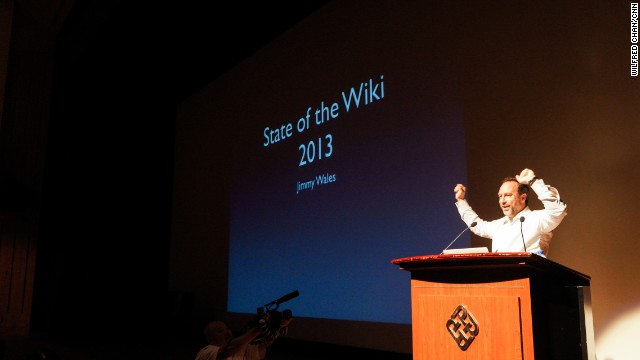Wikipedia founder calls for new model of journalism in 'era of Snowden

Jimmy Wales told the "Wikimania" conference that Wikipedia now has 8 languages with over 1 million articles.
Hong Kong (CNN) -- Edward Snowden may have left the city, but on Friday Wikipedia founder Jimmy Wales told a crowd of devotees gathered in Hong Kong for the website's annual "Wikimania" conference that the fugitive leaker's actions had given him new ideas about the online encyclopedia's future.
"We live in the era of Snowden and (WikiLeaks founder Julian) Assange," declared Wales in a keynote address to the crowd, which organizers said had over 500 people from 90 countries. "All kinds of information that people would prefer to remain secret or private are being exposed."
Wales said Snowden's leaks about sweeping spy programs caused him to have a "serious rethink about security." Fearing intrusions from government agencies like the National Security Agency in the U.S., Wales announced that Wikipedia would move to encrypt its pages using SSL, or secure socket layer encryption, which protects users from outside monitoring.
Pointing to examples of poor mainstream media coverage on internet security issues, Wales also asked Wikipedians to help him think of a new "hybrid model" of journalism, where volunteers could work with professional journalists to produce serious stories that would counter "tabloid nonsense" like stories about the girlfriend of Edward Snowden, the former NSA contractor who leaked some of the agency's top secret programs to the media from a hotel room in Hong Kong before receiving temporary asylum in Russia.
Wales showed an image of mainstream news clippings to prove his point. "(Snowden's girlfriend) is heartbroken because he's fled Hawaii ... he misses his girlfriend... I don't see anything here about who exactly is going to get arrested at the NSA for spying on people illegally," he said.
"What we really need to do is use editorial judgment to say, 'What really matters?'"
He proposed a setup in which a carefully vetted volunteer community could be potentially be "in charge of" mainstream journalists.
Stressing that it was merely a brainstorm, the Wikipedia founder invited his community to email him with software and design ideas.
Reactions to the Wiki-journalism idea were mixed among attendees.
"I think [Wales] didn't think about it very much," said Silvia Stieneker, 35, a Wikimedia employee from Germany. "You cannot compare media that has to sell headlines to make them interesting to something like an encyclopedia."
"I don't think it will replace traditional newspapers," said Andre Costa, who works for Wikimedia in Sweden, "but it should be an alternative."
In an interview with CNN Wales said he had "great hope" that there would be demand for the idea.
"Some have this negativity that oh, the problem is the general public, they just want to read sexy stories about Kim Kardashian or whatever, it's hopeless, right?
"But you know what? A website that's more popular than the top 20 newspapers in the world combined is Wikipedia. And people are reading very serious things on Wikipedia. There's clearly a demand from the public."
"I think it's time we start being a little more radical in our thinking."
Another key topic discussed at this year's Wikimania was diversity.
"I think Wikipedia has a sexism problem," said Stieneker, who runs a workshop in Berlin that empowers women to write for Wikipedia.
Stieneker says "harsh words for women" are still sometimes used to attack female users, particularly in debates over articles related to gender issues. But she acknowledged that "the huge majority of Wikipedia is not sexist and very helpful."
She says just seven percent of the German Wikipeida community are women, compared to 13% of the general Wikipedia population.
Wales is aware of the imbalance. "We really want more women editing," he told CNN. "We're doing a lot of outreach programs."
Wikipedians say other inequalities also exist on the site. Josh Lim, a Wikipedia project director from the Philippines, said he has seen "culture clashes" between Wikipedia's "core demographic of white, highly-educated males in Western countries" and editors of less-represented backgrounds.
"An American administrator might delete an article about a school in the Philippines because he thinks it's 'not notable,' which we would take personally," he said.
According to Lim, "systemic bias" from Westerners has discouraged his team, and many editors have left.
Wales acknowledged the tensions. "There will always be some cultural conflict around the edges about what's notable and not. And sometimes we make the wrong decisions."
"But we generally get it right because our community has a spirit of inquiry and desire of understanding. And it's great if a member of our community stands up and says we're doing this wrong, and you need to stop and think about it."
"One of the great things about the Wikipedia community -- that can be exhausting -- is we talk about everything," said Wales.
No comments:
Post a Comment